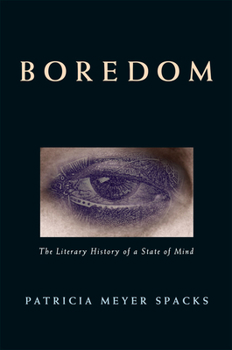Boredom: The Literary History of a State of Mind
Select Format
Select Condition 
Book Overview
This book offers a witty explanation of why boredom both haunts and motivates the literary imagination. Moving from Samuel Johnson to Donald Barthelme, from Jane Austen to Anita Brookner, Spacks shows us at last how we arrived in a postmodern world where boredom is the all-encompassing name we give our discontent. Her book, anything but boring, gives us new insight into the cultural usefulness--and deep interest--of boredom as a state of mind.
Format:Hardcover
Language:English
ISBN:0226768538
ISBN13:9780226768533
Release Date:February 1995
Publisher:University of Chicago Press
Length:304 Pages
Weight:1.10 lbs.
Dimensions:0.9" x 6.3" x 9.2"
Customer Reviews
2 ratings
Anything but boring
Published by Thriftbooks.com User , 22 years ago
This book is anything but boring; it's one of the most fascinating I've read in a long time. Spacks examines the idea of boredom, its genesis and implications, and forces readers to acknowledge that it is a culturally constructed concept, not a naturally occurring one. She historicises the word and the assumptions about the world that it reflects. The fact that most of us can't conceive of the world or our response to it without this category of experience only reinforces her point of how much it has become naturalised. But it reinforces a deadening passivity in our experience of life. The statement "I'm bored!" says much more about the person who is bored than it says about the ostensible cause of the boredom. Read Spacks and learn to pay active attention again.
Chronic boredom: a much needed female perspective
Published by Thriftbooks.com User , 26 years ago
After researching the topic of chronic boredom myself for the past four years it was gratifying to finally come accross a text that dealt with the problem from the perspective of women writers, thinkers and culture critics from the Enlightenment on. The great literary text on the topic by Reinhard Kuhn 'The Demon of Noontide: Ennui in Western Literature' did not deal with much of the material here covered by Spacks - though it dealt with just about everything else associated with the topic. Spacks' treatment of the topic mixes analysis of high literary texts with analysis of other cultural discourses often ignored by the traditional modernist culture critic. The consequence is that the voices of hundreds of women - and not merely middle and upperclass women - who have suffered from the malady since the 18th century are heard for the first time. But Spacks' work offers much more to the reader than a female perspective on an old malaise. Her particular emphasis is delivered within the broad tradition of writings on the topic and as such she never loses the overview. Her work provides a scholarly reinterpretation of this much underestimated phenomenon. Chronic boredom, as Healy, Kuhn, Klapp, George Steiner and now Spack's tells us, is one of the great maladies of the twentieth century. At its worst it is one of the most crippling 'maladies of the subject' and clearly, as Spacks seems to suggest, it is often generated by oppressive (subtly or otherwise) social structures. To read Spacks' work alongside Kuhn's is to gain a full overview of a malaise that has been with us since Lucretius and Seneca, but which threatens, more than ever before, to sap personal and social existence of all meaning, and spirit (elan vitale). Spacks' work does not bore, however. Why? Because her tone of high seriousness reveals to the reader something insidious and disturbing about our postmodern social structures.We are confronted in the text with a malign social something masquerading as something innocuous and harmless, mre 'boredom'. Chronic forms of boredom can be vicious and life threatening - both for individuals and for societies. Spacks', more than any other writer on the topic, comes close to linking the problem to terms like 'oppression', 'trauma', 'alienation', disenchantment',' angst' and so on. This her inheritance from feminist and postmodern critical discourses. We are in the mainstream of modernist/psotmodernist discourses on culture and the' crisis of subjectivity'. As TS. Eliot once commented, chronic ennui is a modern form of the great medieval scourge of 'acedia', and acedia, we gleen from the medieval texts, was capable of utterly destroying the psychic and spiritual world's of its victims.






